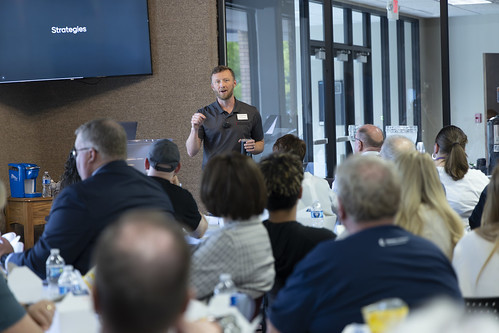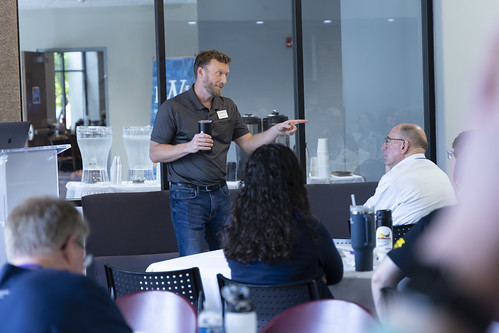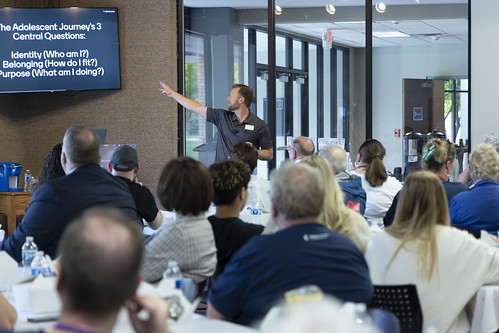
Annual Conference Workshop: Gen Alpha is Not the Church's Gen Omega

Chris Wilterdink, Discipleship Ministries. (photo by JLynn Studios
Chris Wilterdink, Discipleship Ministries, led a Lunch-n-Learn session at the 2025 Annual Conference entitled "Gen Alpha is not the Church's Gen Omega." In this workshop, he covered basic demographic information about Generation Alpha (people born between 2010-2024), observations from churches that are doing ministry well with this age group, and thought-provoking questions for church leaders to consider.
Wilterdink started the session by talking about the societal differences that have appeared and created a greater divide among generations.
"People fear change. When we talk about generational stuff, the world that generation Alpha is growing up in has changed from the world that we all grew up in," said Wilterdink.
Not only are people afraid of change, but they often fail to recognize the changes that have taken place. This failure prevents them from adapting and changing with them. One example of this would be the milestones that make you "an adult" in the eyes of society.
Wilterdink explained, "There is this sliding gray scale that makes it complicated for a young person to know when they're grown up. If you have a young adult group in your church and it has 45 and 50-year-olds in it, you're going to have to encourage them to grow up into an adult group and make space for those true young adults."
In the past, there were very distinctive events that you would go through in life to be considered an adult. These things include graduating from college, getting your first job, becoming financially independent, buying a house, getting married, and having children. Now, those standards have significantly changed, and it is harder to be seen as a successful adult without those "requirements".
"The traditional markers of what it means to be an adult continue to change. In the church, I think it is really important for us to be able to figure out how to recognize spiritual maturity in addition to age level maturity as we talk about young persons," shared Wilterdink.
Due to the decline in church goers that started around Gen X, there are fewer connections with young generations in the church.

Chris Wilterdink leading AC2025 Lunch-n-Learn (photo by JLynn Studios)
"When you are starting to make connections and relationships at a church with Gen Alpha, you've got kids that may or may not have ever had a faith experience or ever set foot in a church before. You also have the parents that are in that same boat," said Wilterdink. "When talking about discipleship, bible studies, you're probably needing to engage the parents of Gen Alpha at the same level that you are engaging Gen Alphan because they may not have been a part of a church up to this point."
Next, Wilterdink shared with the participants the distinct characteristics that have been noticed across Gen Alpha. One example is how they communicate.
"The first place that Gen Alpha will look to communicate is through devices, apps, and platforms -- in-person conversation happens second. This is very different from the older generations, where you would get to know somebody in person first, and then maybe you get their phone number. Now it is the other way around," explained Wilterdink.
Another characteristic is how socially aware and vocal the younger generations are.
"Because there is a 24-hour cycle of news, the opportunity to be exposed to different topics and issues is always there. Both Gen Z and Gen Alpha are not afraid to name the things that seem to need to change," Wilterdink pointed out.
The last characteristic Wilterdink highlighted was the ways that Gen Alpha has grown up faster than previous generations due to the things that they are exposed to.
"With the unlimited access to information, there are very adult things that Gen Alpha and Gen Z get exposed to in their childhood and teenage years," Wilterdink said. "There is not a great way to put up filters, because it is always going to be there. What you can do is be present in processing that stuff and creating a culture and a system that invites questions and conversations so that when a young person is exposed to something new, they have somebody that they trust to be able to talk with about that experience or what they are learning."
Wilterdink closed the Lunch-n-Learn session by outlining some different ways that churches and church leadership can shift their approach to serve Gen Alpha better. He first talked about having an emphasis on community.

Lunch-n-Learn participants the important of Identity, Belonging, and Purpose (photo by JLynn studios)
"When trying to connect with young people, build a communal emphasis as opposed to an individual emphasis. You need to be able to build relationships and friendships and do that alongside people instead of directing it to them, so be together in the activities that you are planning," expressed Wilterdink.
To connect with Gen Alpha, it is not about finding the right programming, but instead making the right connections.
"Be a steward of stories, not just a dispenser of programming. We are all journeying towards Christian perfection. We're never necessarily going to get there, but that's not a reason not to try. So don't spend your time looking for the perfect program or the perfect curriculum," advised Wilterdink.
Finally, Wilterdink talked about the best way to truly make Gen Alpha feel welcome in your congregation, by fostering connected relationships.
"Research shows both from Pew and Fuller, that is you have seven adults in your congregation that know the name of a kid and can ask them specific questions about what is going on in their life, that is what is going to keep that individual connected. The relationships are what keep them connected," Wilterdink shared.
View the PowerPoint presentation from this workshop here and the video recording here.